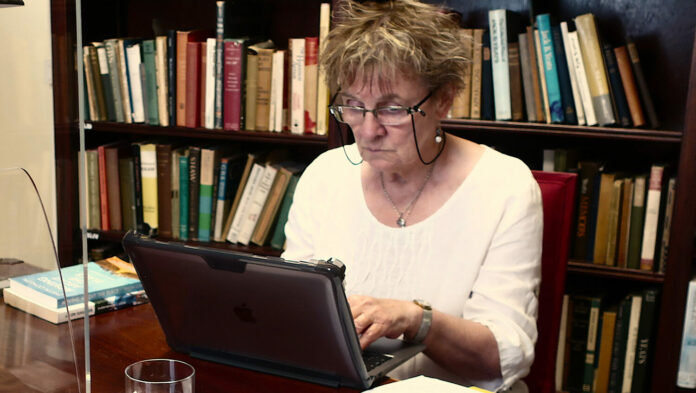IRELAND’S evolving society and what it has meant for women writers will be discussed at a forthcoming literary event.
Look! It’s a Woman Writer! Irish Literary Feminisms 1970-2020 is one of the Ennis Book Club Festival events and will be held at Glór on March 4.
In 2021, author Éilís Ni Dhuibhne asked 21 writers who were born in mid-twentieth-century Ireland, north and south, to write about their literary lives.
Collectively, these vivid, original essays make up Look! It’s a Woman Writer! Irish Literary Feminisms, 1970-2020 and provide a picture of Ireland’s literary landscape from multiple female points of view.
These writers came of age when legislation for gender equality was beginning to be enacted. They are now growing older on an island where a great deal has changed and were activists and voices when it really mattered.
Evelyn Conlon is one of the women included in the book and she will be part of the panel at Glór to chat about her experiences, along with fellow authors Lia Mills and Catherine Dunne.
When her collection of short stories Moving About The Place was published last year, an Irish Times reviewer stated that such is the quality of her work “that it should be impossible to discuss her generation’s achievements without addressing Conlon’s own”.
The review asked why she is not more often discussed along with the likes of Colm Tóibín, John Banville and Sebastian Barry, and her own lower profile perhaps illustrates a lingering difficulty that female writers of literature have in achieving recognition.
When she spoke to the Clare Champion she would not be drawn on whether she, personally, has been underappreciated, but she says that Irish female writers have definitely had greater obstacles to overcome than their male contemporaries.
“I think, particularly in the past, there was certainly a problem, absolutely, definitely a problem. I think it has probably dialled down a bit, that same problem.
“But the interesting thing really about this book (Look! It’s a Woman Writer! Irish Literary Feminisms, 1970-2020) is it sets out the history of the people who, at the point that it was difficult, were working.
“But then again it would depend on what work you were doing. Obviously there was some work that was not particularly problematic, but work that was on the cusp of showing changes happening in Ireland, it was more likely that an effort would be made not to let it get out.”
Often this took the form of not publishing certain novels and stories.
“There are two forms of censorship. One is you get published and then the work is censored. The other is you don’t publish the work.”
Many years ago she herself edited an anthology of short stories written by Irish women, and while she has reservations about dividing writers on the basis of gender, she felt it was what was required at the time.
“I don’t cherish the idea of separating male and female writers, I don’t like it, but at times it had to be done in order to bring notice to work being done by women writers.”
While she had work published that dealt with social change, she feels some people were uncomfortable with what she was doing.
“I was trying to represent women as they were in the 1980s and ‘90s. I’m not saying it was a new thing in Irish literature, but the view that I was taking and the characters I was writing about, represented changes that were happening in Ireland and there were people who were resistant to that.”
She wrote about people who had issues with the social order that prevailed for much of the 20th Century.
“I wrote a short story called The Park, which is about people who protested, women and men, who protested against the Pope’s visit.
“The narrative that is always given is that in 1979 everybody in Ireland was utterly delighted about the Pope’s visit, that wasn’t true, there were lots of people who were utterly depressed by his visit, and at that time were fighting for things like legal contraception and divorce, things that are not just women’s rights but human rights. They were extremely depressed by the Pope’s visit.”
Another story, written in the 1990s, is about a theme that still resonated now.
“I wrote a story called Birth Certificates about the rights of people who were adopted to find their natural mother. When that story was published there would have been way more difficulty in people trying to get any kind of information.
“It’s 25 years at least since I wrote that story and the last line in the story is that the Government now pay someone to help people to find their children and I thought ‘that’s exactly what’s happening now’. I created the story around a woman who was trying to help people find their natural mother.”
She feels that engaging with such themes wasn’t particularly welcome until quite recent years.
“A lot of interesting political work that was done then was lost, but it wouldn’t be lost now. I’m not just saying the publishers; that work of mine was published and The Park was in the Sunday Tribune, which was extraordinary.
“But what would happen would be that work like that would be published and there would be silence.”
Even now she feels that reviewers often don’t take a broad enough view of the literary scene in Ireland.
“One of the other things that is colossal, and it still takes place, is reviewers talking about Irish work but leaving women out. I remember a very famous one where somebody said that nobody had written a book about the Celtic Tiger. What he really meant was that none of his particular cohort had written one. He was talking about a few male novelists, but there had been lots of work done.”
“A lot of it would come from ignorance, not ignorance as in rudeness or whatever, but as in not knowing what’s going on.”
*Look! It’s a Woman Writer will be hosted by Arlen House publisher Alan Hayes.
Owen Ryan has been a journalist with the Clare Champion since 2007, having previously worked with a number of other publications in Limerick, Cork and Galway. His first book will be published in December 2024.


